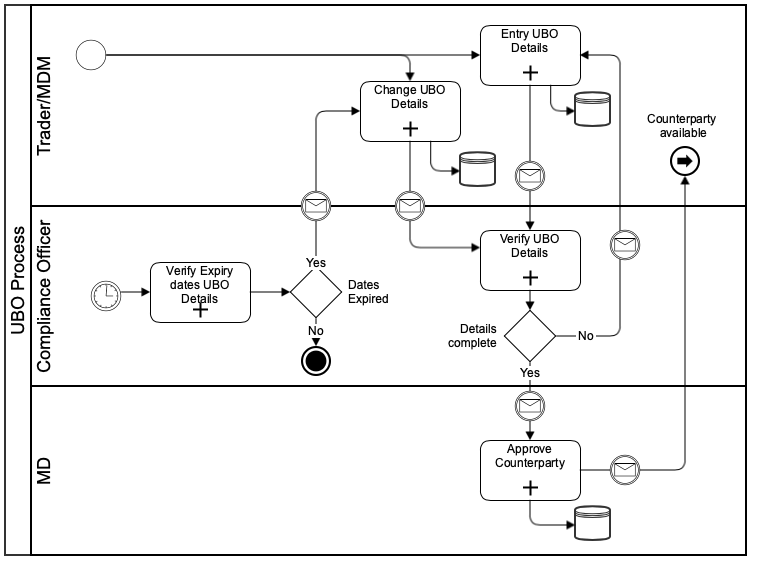
Ultimate Beneficiary Owner registration in relation to Commodity Trade
We see a growing pressure with our customers and in the market in general, to comply with Anti-Money Laundering (AML) regulations. This is in the face of terror attacks, drug trafficking, and other nefarious activities, money laundering a growing concern that cuts across borders and societies. As a result, banks and financial institutions (FIs) take their Ultimate Beneficial Ownership (UBO) compliance with utmost seriousness. Globally, cases such as the Paradise Papers, Unaoil, and VimpelCom reiterate the need for deep, complex, thorough customer due diligence.
Although a Commodity Trader (CT) is not a financial institution we see growing pressure from their banks to provide them all the details of their financial transactions. Next to that, they also need to provide proof of the onboarding process of their trading partners (customers and vendors). In this onboarding process, the banks expect the same customer due diligence (documentation, data, and identity verification) to be done as if Commodity Traders are FIs. This is the result of prosecutors investigating these FIs like the ones at ING and ABM Amro.
The objective is clear: Due to this development, CTs need to identify and verify who their customers are and where their funding originates with the ultimate goal of preventing money laundering or terrorist financing. To accomplish these objectives, CTs must be capable of identifying the beneficial owners of every legal entity customer. But this is not where it stops. The FIs demand their customers to provide the information that is needed to identify these beneficial owners. Thus, there is a growing necessity to:
- Check Geopolitical Risk Ranking-Understand risk exposure by country.
- Perform Due Diligence – Providing in-depth background checks on business relationships.
- Execute Risk Screening – For rigorous and comprehensive screening.
Who are UBO’s and why do they matter?
A UBO refers to any person with direct or indirect ownership or control of an entity. Obtaining accurate beneficial ownership information is crucial to:
- Ensure screening and provide risk rating for all the required parties against Politically Exposed Persons (PEPs) or as having negative news associated with the UBOs.
- Ensure the CT does not do business with sanctioned customers associated with the UBOs.
- Understand the potential risk that a UBO poses to an FI through its relationship with multiple customers and vendors.
Dealing with UBO’s in your organization
When onboarding a new trade partner, a CT must perform customer due diligence (CDD) and, in some higher-risk cases, enhanced due diligence (EDD). The process requires validating company vitals, identifying the beneficial owners, and verifying the UBO’s. One of the biggest challenges that CT is collecting information about UBO’s and recording it in a way the Fls that audit this information can be satisfied. The identification process starts with a simple onboarding form but to be certain services like Compliance Alliance can be used to perform the CCD.
Preventing that a Trade is done before this process is completed, is essential to maintain the integrity towards the Fls that provide funding to a CT. Within Arantys, we provide this process (in the diagram) across the different roles in your organization to facilitate this. It includes a full workflow between the involved people to ensure minimal disruption in performing the trade.
What about GDPR?
Since the UBO registration efforts require an intense focus on personal data, the restrictions introduced by GDPR may represent a challenge for your organization. More specifically, the legal scope of GDPR may clash with the way you identify counterparties during your due diligence procedures and how they manage their risk thereafter. Therefore, it is worthwhile to dive into this topic a little more.
Article 6 of GDPR requires data controllers to establish a legal basis for collecting and processing personal data – including data required for AML purposes. For institutions with AML obligations, the most relevant justifications provided by Article 6 are:
Article 6 of GDPR requires data controllers to establish a legal basis for collecting and processing personal data – including data required for AML purposes. For institutions with AML obligations, the most relevant justifications provided by Article 6 are:
- Article 6(c) – which allows for the processing of personal data “for compliance with a legal obligation to which the controller is subject” – typically, AML laws or sanctions.
- Article 6(f) – which allows for data processing for “legitimate interests”, justifiable on a case-by-case basis.
One of the most significant aspects of the GDPR is Article 17, which introduces the ‘right to be forgotten’. That right allows data subjects to request the deletion of their personal data under certain circumstances. This rule may be in contention with AML law, which requires data to be held long after a business relationship has ended.
Under GDPR Article 17(3)(b), however, legal requirements take precedence over the right to be forgotten. From an AML perspective, the EU’s 4th Anti- Money Laundering Directive (4AMLD) introduced the requirement that both customer due diligence and transaction records be retained for 5 years after the end of the customer relationship. In this context, the right to be forgotten would only be enforceable after this period had ended.
What do we register?
Within Arantys, we provide you with the possibility to record your research on if the UBO is a Politically Exposed Person, and if the person is on a sanction list of the OFAC, EU and/or Association Of Financial Mutuals. Next to that you can register facts like Passport information in a structured way so that you can report and audit it on a regular basis. When a Fl request proof of your customer due diligence, it is easy to provide it as a result of it. Arantys takes the legal requirements into account and provides you with a way to manage this within the integrated solution we provide within Oracle JD Edwards EnterpriseOne.
Interested?
Cadran is able to demo this to you now! Interested in a demo? Contact Bart Dix for any questions!
Auteur: Sjors Oosterwaal
Operation Manager CTRM at Cadran Consultancy




